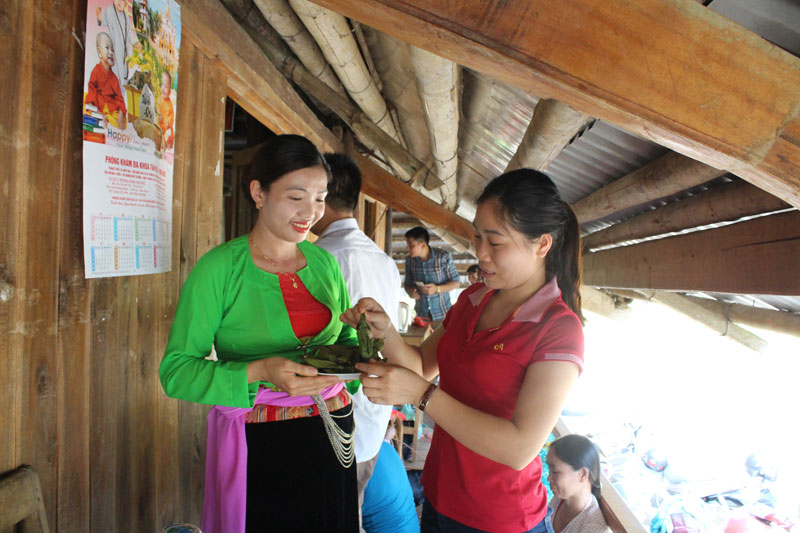
(HBO) - The traditional celebration of the Independence Festival in Lac Son district is associated with the Vietnamese people’s most resounding historical event in the 20th century – the success of the August Revolution in 1945.
 "Banh uoi” (uoi cake), which represents the solidarity and
love for life, is an indispensable dish in the Independence Festival of people
in Muong Vo area of Nhan Nghia commune, Lac Son district.
"Banh uoi” (uoi cake), which represents the solidarity and
love for life, is an indispensable dish in the Independence Festival of people
in Muong Vo area of Nhan Nghia commune, Lac Son district.
Under the Party’s leadership, people nationwide
launched a general uprising in August 1945 to seize power and break chains of
slavery. Following the revolution’s victory was the National Day September 2,
1945, when the Democratic Republic of Vietnam (now the Socialist Republic of
Vietnam) was established, opening up an era of independence and freedom.
joining compatriots across the country in
celebrating the triumph, the administration and people of Lac Son district also
marked the first Independence Festival in 1945.
Nowadays, whenever the Independence Festival
approaches, local residents become busy preparing for celebrations. Communes
will be decorated with banners, flags and flowers while a wide range of
meaningful activities will be held, reflecting the spirit of "Nothing is more
precious than independence and freedom” as stated by late President Ho Chi
Minh.
Bui Van Thuom, former Secretary of the Party
Committee of Lac Son district, said it is an everlasting spirit that has been
deeply instilled into the local populace and spread across the district,
becoming the tradition of celebrating the Independence Festival annually.
Studying culture of the Muong Vang area and the
Muong ethnic group in Hoa Binh province for many years, Bui Huy Vong, a
resident in Huong Nhuong commune of Lac Son district, highly valued the
tradition of celebrating the Independence Festival on August 19 and September 2
in some communes of Lac Son, which he said is not only typical for a large
Muong ethnic area but also enriches the value of the August 19 victory and the
National Day on September 2.
Secretary of the district’s Party Committee Bui
Van Hanh affirmed that all-level Party committees, authorities and people of
Lac Son are always proud of their Independence Festival celebrating
tradition./.
With an increasingly vibrant and widespread emulation movement aimed at building cultured residential areas and cultured families, Yen Thuy District has been making steady progress toward improving both the material and spiritual well-being of its people, while fostering a civilized, prosperous, beautiful, and progressive community.
Once lacking recreational spaces and community facilities, Residential Group 2 in Quynh Lam Ward (Hoa Binh City) has recently received attention for the construction of a new, spacious, and fully equipped cultural house. The project followed the model of state support combined with public contributions in both labor and funding.
The "All people unite to build cultural life" movement, which has been effectively integrated with Kim Boi district’s socio-economic development goals, is fostering a lively spirit of emulation across local residential areas, hamlets, villages, public agencies, and enterprises. In addition, through the initiative, traditional cultural values are being preserved and promoted, while community solidarity and mutual support in poverty reduction and economic development are being strengthened.
A working delegation of the Hoa Binh provincial People’s Committee led by its Permanent Vice Chairman Nguyen Van Toan on June 11 inspected the progress of a project to build the Mo Muong Cultural Heritage Conservation Space linked to tourism services in Hop Phong commune, Cao Phong district.
Born and growing in the heroic land of Muong Dong, Dinh Thi Kieu Dung, a resident in Bo town of Kim Boi district, in her childhood was nurtured by the sweet lullabies of her grandmother and mother. These melodies deeply imprinted on her soul, becoming an inseparable part of her love for her ethnic group's culture. For over 20 years, this love for her hometown has driven Dung to research, collect, and pass down the cultural values of the Muong people to future generations.
In the final days of May, the Ethnic Art Troupe of Hoa Binh Province organized performances to serve the people in remote, mountainous, and particularly disadvantaged areas within the province. These were not just ordinary artistic shows, but they were the meaningful journeys aimed at spreading cultural values, enhancing the spiritual life of the people and contributing to the preservation of ethnic minority cultural identities.



 "Banh uoi” (uoi cake), which represents the solidarity and
love for life, is an indispensable dish in the Independence Festival of people
in Muong Vo area of Nhan Nghia commune, Lac Son district.
"Banh uoi” (uoi cake), which represents the solidarity and
love for life, is an indispensable dish in the Independence Festival of people
in Muong Vo area of Nhan Nghia commune, Lac Son district.